Mandela: the Long Wait
- Share via
As the weeks grow into years and the years stretch into decades, Nelson R. Mandela remainsin prison--symbolizing the plight of South Africa’s 26 million blacks living under apartheid. Both Mandela and his people have waited and struggled a long, long time for freedom, and are waiting still.
Now the 70-year-old black nationalist leader, serving a life sentence since 1964 for sabotage and conspiracy to overthrow the white regime, is reportedly ill with tuberculosis. His illness poses one of the most difficult dilemmas of South African President Pieter W. Botha’s 10 years in power.
When the government locked up Mandela, it hoped that he would become a non-person; instead he has become the world’s most famous political prisoner. The government is afraid that if he dies in prison, rebellious blacks, now held in check by repressions imposed by the two-year-old state of emergency, will be provoked into new levels of violence that will increasingly spill over into white communities. But Mandela’s release could provoke an angry backlash from right-wing whites and a new wave of anti-government activism.
On Thursday Botha repeated an offer first made in 1985: If Mandela renounces violence he will be set free. Why has Mandela continued to reject this offer? Because he and thousands of other South Africans tried to change the racist South African regime through nonviolence--to no avail. The intransigence of white South Africans, especially the Afrikaners, bloody police repression from Sharpeville in 1960 to Soweto in 1988, and the continued existence of apartheid over the years have forced Mandela and the outlawed African National Congress to view violence as inevitable under the present circumstances.
A government that systematically uses extreme force and repression to affirm its control, and that denies democratic freedoms to 80% of its citizens, cannot expect its opponents to turn the other cheek. Even Gandhi, the apostle of nonviolence, was not very successful when, early in his career, he fought for the rights of blacks and coloreds in South Africa.
The dynamics of politics in South Africa are such that it is difficult to be optimistic about the future. The white minority will likely continue to resist dismantling apartheid in any fundamental way, the black population will grow increasingly radical, and the potential exists for South Africa to follow Lebanon into the vortex of chaos.
Mandela, however, could make a difference. He is the one leader respected by all African factions. His following bridges ethnic and tribal rivalries as well as the generational split between older moderates and young radicals. While a committed nationalist, Mandela is more moderate than many of his younger counterparts. White South Africans should think about negotiating with Mandela while he is still alive.
If the country’s white regime released Mandela unconditionally, it would give de facto recognition to the ANC, and maybe talking could then replace shooting, beating and bombing. If Mandela were released, Botha’s National Party would feel the wrath of white voters in the October municipal elections. But two facts favoring his release are the worries over Mandela’s health and the government’s desire to head off possible economic sanctions by the next U.S. Administration. South Africa is at a crossroads. Releasing Mandela would put a new set of dynamics into play. The slim possibilities for a peaceful solution to the South African nightmare must be given a chance.
More to Read
Sign up for Essential California
The most important California stories and recommendations in your inbox every morning.
You may occasionally receive promotional content from the Los Angeles Times.













